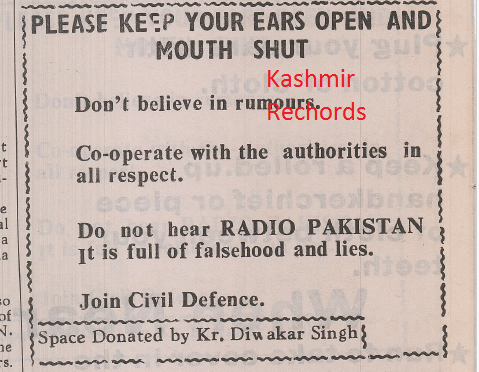(Kashmir Rechords Report)
In the wake of the recent Pahalgam terror attack, India has launched “Operation Sindoor”—a robust counter-offensive aimed at avenging the blood spilled in Kashmir. Alongside this strategic military response, the government has announced nationwide civil defence mock drills to bolster emergency preparedness and educate citizens on how to respond to potential future threats.
But for the seasoned residents of India’s border belts, especially in Jammu and Kashmir and Punjab, this initiative feels more like a revival than a novelty.
Echoes from the Past
For those who have lived through past conflicts, the sight of Civil Defence volunteers springing into action evokes vivid memories. In times of war or cross-border provocations, these volunteers were often the first line of civilian readiness, guiding people on dos and don’ts during air raids or any hostile incident.

Old-timers fondly recall how newspapers of yesteryear would brim with government-issued advisories—alerts, instructions, and warnings, not just on physical safety but also on psychological warfare waged by enemy broadcasters.
‘Radio Jhootistan’: The Propaganda War That Never Stopped
During the 1971 Indo-Pak war, Radio Pakistan earned the infamous nickname “Radio Jhootistan” for its relentless misinformation campaigns. Civil Defence efforts weren’t just about blackout drills and sirens—they were also about building mental resilience against enemy propaganda.
Kashmir Rechords is proud to reproduce two rare and evocative newspaper clippings from December 1971, showing how people were taught to resist false narratives and stay alert amid chaos. One advised citizens on what to do during air raids; the other warned them to dismiss lies spread by Pakistan’s radio propaganda machine.

From Radios to Reels: The New Face of Misinformation
While Civil Defence still adheres to its time-tested Standard Operating Procedures (SOPs), the landscape of misinformation has drastically evolved. The once-centralized disinformation channels like Radio Pakistan have now been replaced—or rather, amplified—by the unregulated chaos of social media, where malicious actors across and within the border exploit AI tools and modern tech to spread disinformation at scale.
Despite strong interventions by the Government of India, including the identification and blocking of rogue handles and propaganda channels, the flow of misinformation continues to challenge national security and public trust.
The Wolf Still Howls: A Battle of Vigilance
As the saying goes, “a wolf may lose its teeth but not its nature.” Though the medium has changed, the motive remains the same. Radio Jhootistan might now be silent to many ears, but its spirit lives on in deceptive tweets, AI-generated deepfakes, and viral hate content.
Civil Defence, once a relic of wartime drills, is again stepping into the limelight—not just to train people in physical preparedness, but to arm the public with awareness in the age of digital deception.